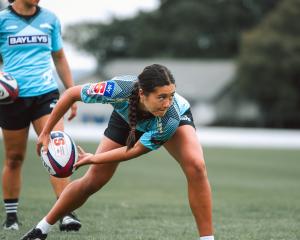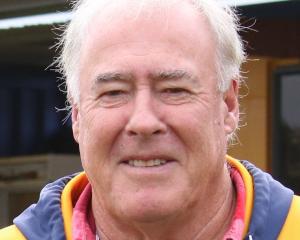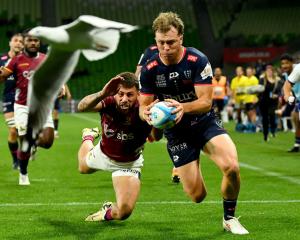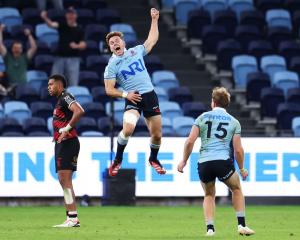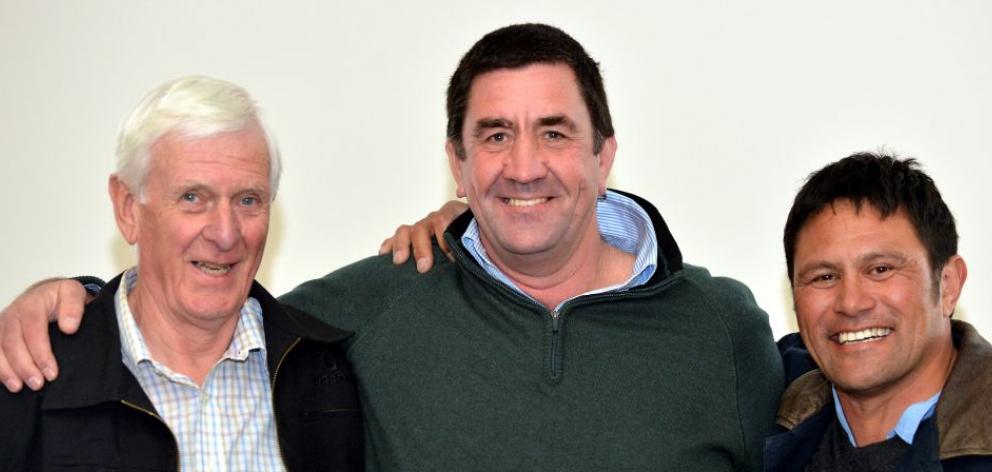
Otago's most-capped player, Richard Knight, former Otago coach and All Black assistant coach Tony Gilbert, and former All Black and Otago outside back John Timu all talked about their careers at a luncheon at Forsyth Barr Stadium on Sunday, with the proceeds going to the Otago Medical Research Foundation.
The trio discussed the way the game had evolved from the amateur days to full professionalism and what it was like playing for Otago under the tutelage of coaches such as Laurie Mains and Gordon Hunter.
Timu, who now lives in Wanaka, was first picked for Otago in 1988, playing 101 games for the province, and 26 tests for the All Blacks.
He went to the Bulldogs league side at the end of 1994 and said he was lucky he picked that Sydney club.
''After two weeks of pre-season training, I wanted to come back to Dunnos [Dunedin]. But the good thing with Canterbury was they were a family club. They were very much like Otago. They had a guy there, the CEO, Peter Moore, who was a great guy,'' Timu said.
''And the one thing there, was Canterbury was one of the few clubs where you also had to work. You had to have a job outside professional league.
''That meant you had to have time away from playing league. Everybody becomes stale. I love crayfish but if you had to eat it all the time you would soon get sick of it.''
Timu, who said he was lucky enough to experience the best of amateur and professional sport in his playing days, said there was no video analysis back in the days of playing for Otago.
''We used to have a session in the changing rooms on Tuesday where we just had a ding-dong talk about things. There was nowhere to hide, really. But you didn't want to let your team-mates down. You knew if you did something wrong you would cop it.''
Knight played 170 times for Otago and joked that in all that time he scored six tries.
He said any time he scored a try, Otago coach Laurie Mains used to give him a rocket for not doing the hard stuff.
Knight doubted he would survive in the modern game with its tight rules, as the game when he played was hard with no quarter given.
''It was tough - a gladiatorial game. You had to kill them or be killed ... that is where the term House of Pain came from, really. We wanted to give sides like Auckland as much pain as possible. We wanted them to go away feeling the pain of Carisbrook,'' Knight said.
Knight had an All Black trial in 1986 and was told either he or his locking partner Gordon Macpherson would make the team.
''He [Macpherson] was two inches [5cm] taller than me so he made it. But what happens, happens. You can only control what you can. You just take what comes.''
Tony Gilbert coached the last Otago team to win the national title back in 1998, and revealed the team had plenty of incentive to win.
He said contracts back then were about a nod and a wink. In 1998, everyone was getting different types of money, and players wanted it more clear-cut.
''We talked about a few things, how to divide it up ... but what was decided on was there would be so much for a win and so much for a loss,' Gilbert said.
''Some guys in the team loved playing for a win. It did work for us, as we did well. But you would never get away with it now. Not with the agents involved.''
Gilbert said being a coach was like being an amateur psychologist, and he felt a monkey could have coached Otago in its last half dozen games to win the title in 1998.
Gilbert said the changes to the game when it went professional were major.
''I was a principal at the time and I had [Otago winger] Paul Cooke working for me as a sports co-ordinator. I was on $60,000 and he was on something like $6.50 an hour.
''He came in to sign his contract and he was going to get $65,000. I said to him, 'You do see the irony in this. I'm now getting paid less than you'.''

